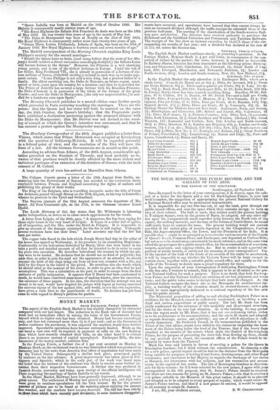The Cologne Gazette quotes a letter of the 28th August
from Berlin, an- nouncing that the Government of Saxony has acceded to the convention lately concluded between Prussia and England concerning the rights of authors and prohibiting the piracy of their works.
The King of the Belgians, who is travelling incognito under the title of Count des Ardennes, passed through Stenay on the 27th August, on his way to Luneville; whence he proceeds to the Tyrol and Switzerland.
The Smyrna journals of the 21st August announce the departure of Me- hemet All from Constantiniple, on the 17th, in the Ottoman steamer Esseri Redid.
The Leeds Mercury of this day states that Mr. Wilderspin is labouring under indisposition, so severe as to cause much apprehension for the result.
A letter from Leipsic, of the 30th, says, " A dangerous fire has been raging for these eight hours in the very heart of Leipsic. It began in a cellar full of spirits, oil of turpentine, and the like, under the Hotel de Pologne. It is impossible to give an account of the damage sustained, for the fire is still raging. Unhappily several workmen have lost their lives." Later accounts say that the fire has been got under.
The copper tube found in the hole which Joseph Henry had dug in the cellar of his house was opened on Wednesday, in his presence, by an examining Magistrate. Conformably to the indications furnished by Henry, there has been found in the tube a prolix and detailed account of all that he intended to do in order to carry his plans into execution. He describes beforehand the manner in which the ms- Ulla were to be loaded. He declares that he should use no kind of projectile; but adds that, in order to give his mad act the appearance of an attentat, he should recount the fable of the slugs being cut from an iron rod, rounded with a file, and held by his finger in the barrel of the pistoL He mentions also the words which he should utter at the moment of his arrest, in order to give an idea that he had accomplices. This was a calculation on his part, in order to escape from the first outburst of public indignation. It appears that if Henry had been condemned to death, he would have contrived some means of making known, after his execution, the existence of those papers. In his idea, the discovery that his attempt was not meant to be real, would have inspired his judges with regret at having exercised the extreme rigour of the law against him, and would, to use his own expression, have given a rude blow to the punishment of death. No decision has yet been come to with regard to Henry's petition for pardon.


























 Previous page
Previous page